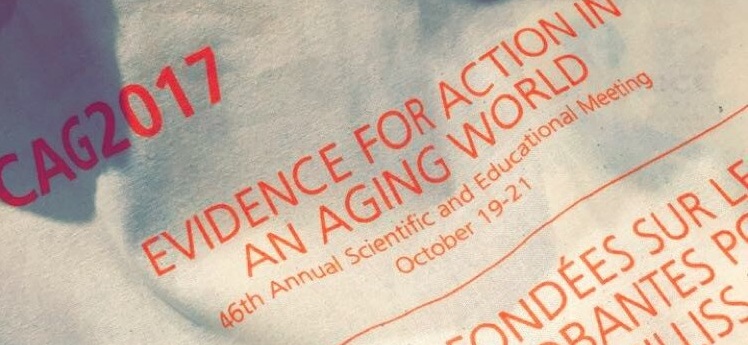
CAG Conference 2017!
The Canadian Association on Gerontology 46th Annual Scientific & Educational Meeting was held in windy Winnipeg this year. “Evidence for Action in an Aging World” was the theme and we were happy to have several presentations submitted from the GERO unit, which are described below.
Tastes like Participatory Action Research: Conducting a Knowledge Translation Intervention with Families in Long-term Care
Jennifer Baumbusch, Alison Phinney, Dyona Dallas, Elizabeth Holmes, Denise Beaton, Isabel Sloan-Yip
Although families are a cornerstone of care in long-term care (LTC) settings, there is a paucity of intervention research with this group. Of those published, it is evident that interventions can enhance family-staff relationships, improve health outcomes for family members, and result in better quality care for residents. Following an extensive search of the literature, we were unable to identify any knowledge translation interventions with this group. To begin to address this gap, we examine our experience, as researchers and family members, in co-creating a knowledge translation intervention. While not explicitly participatory action research, the process undertaken to develop the intervention reflected elements of this approach. The intervention itself entailed a workshop series aimed at increasing family members’ sense of involvement in their relative’s facility by providing education, peer support and networking opportunities. A core group of researchers and family members (‘the development team’) came together to create these workshops. Participant observation was conducted during workshop development meetings and the developers were interviewed about this process of co-creation. Findings illuminate the tensions of this approach to research, such as the privileging of certain types of knowledge (e.g. clinical, empirical, experiential) and power relations among participants. We will discuss how these tensions were navigated (or not) and provide recommendations for further methodological explorations in knowledge translation interventions informed by participatory action research. As we enter a new era emphasizing patient and family engagement in research, this study provides useful insights into how to navigate this terrain in long-term care.
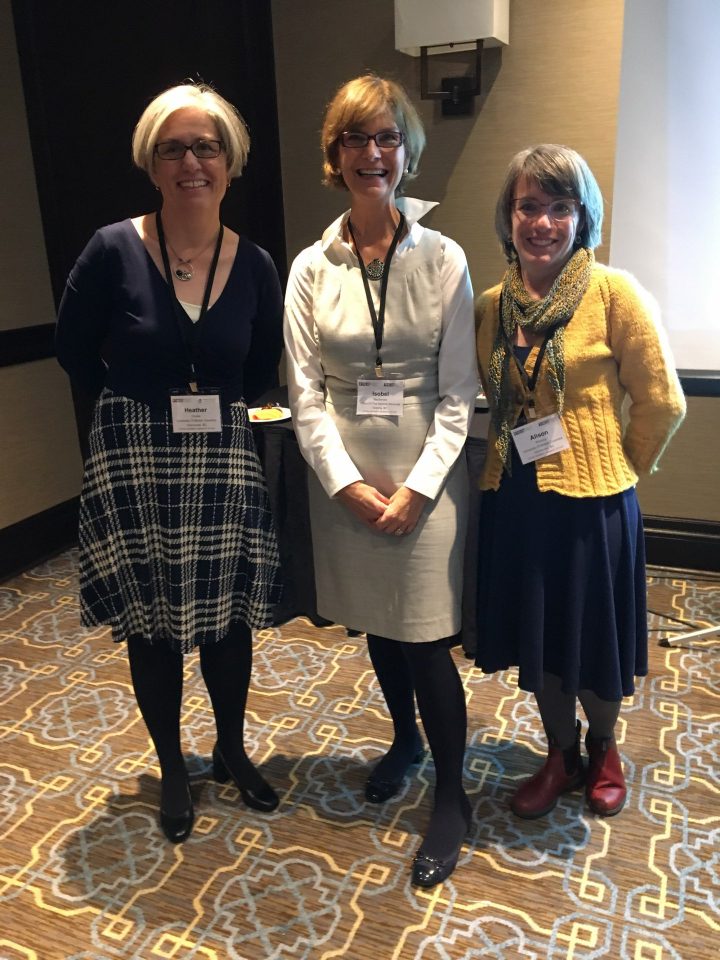
Heather Cooker and Alison Phinney from the GERO research unit pictured with BC Seniors Advocate Isobel Mackenzie.
Dr. Cooke was kind enough to let us know about her experience: “lots of enthusiasm and good dialogue in response to our two IDEAL presentations: It’s the Nature of the Person: Critically Exploring Family Members’ Perceptions of Residential Care Aides in Long-Term Care & What’s In A Name? (De)Constructing Resident Care Conferences in Long-Term Residential Care. Thrilled to present in the same session as Isobel Mackenzie, BC’s Seniors Advocate & hear about the great work their office has been doing.“
SENSE: A Knowledge Translation Intervention with Families in Long-term Care
Jennifer Baumbusch, Alison Phinney, Paddy Rodney, Colin Reid, Elizabeth Drance, Cathy Ward-Griffin, Jo-Ann Tait, Deborah O’Connor
In the current context of LTC, this role is evolving and families are in an increasingly ambiguous position. Building on findings from an ongoing critical ethnography, we co-developed a knowledge translation intervention with family members. The Support, Education, Networking & Sustained Engagement (SENSE) Workshop Series was piloted in the spring of 2017 at a LTC facility in Vancouver, British Columbia. Emerging findings highlight a high degree of engagement among some family members to take part in an intervention aimed at improving their sense of inclusion in LTC. Further, family members identified practical tools to equip them to effectively advocate for their relative and other residents, as well as enhance their knowledge of advanced dementia in order to make time spent with their relative more meaningful.

Alison Phinney presenting at CAG 2017
Do read more on SENSE, CLICK HERE
“It’s the Nature of the Person”: Critically Exploring Family Members’ Perceptions of Residential Care Aides in Long-term Care
Heather A. Cooke, Gloria Puurveen, Jennifer Baumbusch
Long-term residential care (LTRC) is an increasingly complex care environment in which individuals from disparate backgrounds are brought together to both live and work. Much of the hands-on care in LTRC is provided by Residential Care Aides (RCAs; unregulated workers also known as nursing assistants, personal support workers, health care aides), many of whom are women, with dissimilar ethnocultural backgrounds to residents, and relatively low occupational status. However, families also play an important role in LTRC, contributing over 44 million hours of care work each year. To date, the relationships between families and RCAs in LTRC remain under-researched. While a handful of studies have explored staff perceptions of family involvement in LTRC, little is known about family members’ perceptions of RCAs and their work. This presentation draws on data from a larger critical ethnography examining the negotiation of care work in three LTRC facilities in British Columbia. To date, 61 in-depth interviews (23 staff, 7 residents, 31 family members) and 120 hours of participant observations have been conducted. Grounded in critical theory, three key inter-related themes emerged: role expectations (regarding the varying nature of RCAs’ care and the expression of such care); being the ‘right’ kind of person for the job (who is there for the ‘right’ reasons vs. a paycheque); and, the situated context of RCAs (how ethnicity, rurality, and class reinforce embedded notions of care). Findings offer insight into how to better develop meaningful partnerships between RCAs and families that recognize and support staff and family personhood
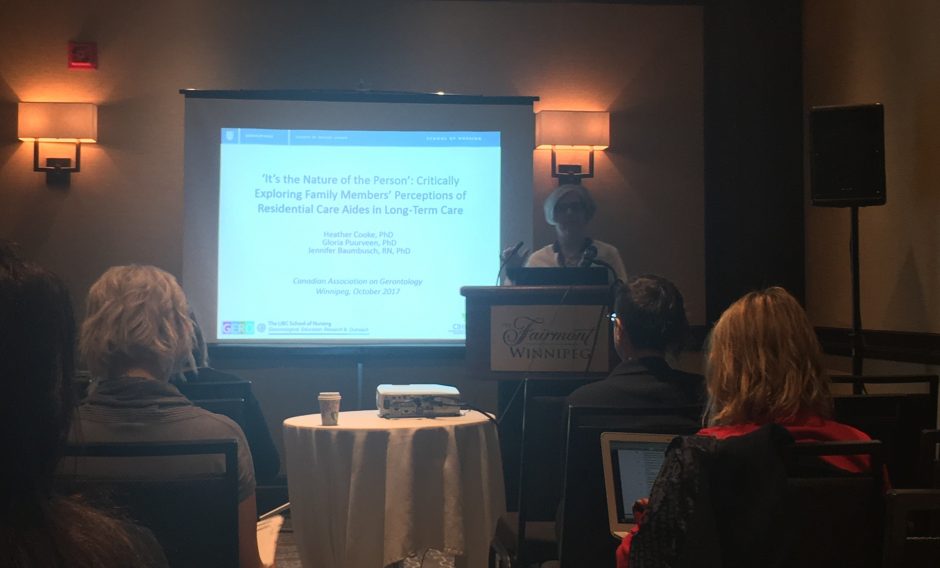
Heather Cooke, presenting “It’s the Nature of the Person”: Critically Exploring Family Members’ Perceptions of Residential Care Aides in Long-Term Care
What’s in a Name? (De)construsting Resident Care Conferences in Long-term Residential Care
Gloria Puurveen, Heather Cooke, Denise Beaton, Isabel Sloan-Yip, Marie-Eve LeBlanc, Jennifer Baumbusch, Rupali Gill
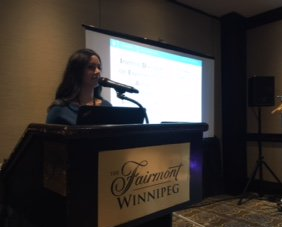
Rupali Gill presenting at CAG 2017
As a way to foster person-centred care and family inclusion, resident care conferences offer opportunities for long-term residential care (LTRC) providers, residents, and family to discuss the resident’s care needs and coordinate and evaluate goals of care. Research on conferences in LTRC has primarily focused on evaluating its effectiveness along specific care outcomes (e.g., improved end-of-life care), with much less of a focus on the process and factors involved in how care is negotiated and understood. Therefore, the purpose of this presentation fills a critical gap by examining the process, structure, and content of resident care conferences in LTRC. This presentation draws on data from a larger critical ethnography examining the negotiation of care work in three LTRC facilities in British Columbia. To date, 61 in-depth interviews (23 staff, 7 residents, 31 family members) and 120 hours of participant observations have been conducted. Grounded in critical theory, thematic analysis identified three intersecting themes: 1) the Missing or Silenced Voice of family, residents, and care aides reflected the 2) Scripted Exchanges that privileged specific disciplinary perspectives. 3) This impacted how residents and their care needs was talked about in Medicalese, Body-Talk and Person-centred ways. Given the potential for care conferences to significantly shape resident care, it is crucial to develop ways to support the effective conduct of these meetings. Key stakeholders must be engaged in developing an approach that facilitates active participation from all members of the care team and avenues for meaningful communication must be developed.
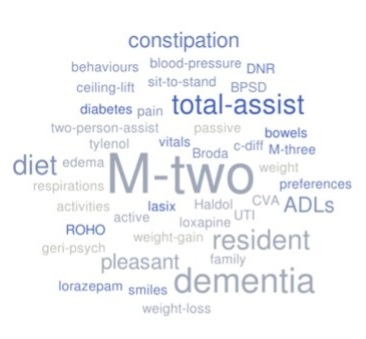
As illustrated in this word cloud, by far the most prevalent way the resident was described was in terms of diagnoses, medications, care practices, and euphemism such as ‘pleasant’ or ‘calm’.
Exploring the Synergies between Focused Ethnography and Integrated Knowledge Translation through a Study Exemplar on Older Adults Undergoing a Cardiac Procedure
Jennifer Baumbusch, Sarah Wu, Sandra Lauck, Davina Banner, Tamar O’Shea
Over the past several years, research funders have increased the focus on ‘real time’ knowledge translation, also known as integrated knowledge translation (IKT). This priority challenges traditional approaches to qualitative research, which often entail in-depth, extended immersion in field work. In this paper, we reflect on our experiences of engaging in IKT while conducting a focused ethnography within a health services context. Employing IKT in concert with focused ethnography resulted in (1) an increased focus on the culture and values of the context under study; (2) a higher level of engagement between researchers, participants, and knowledge users; (3) a commitment to partnership between researchers and knowledge users as part of a larger program of research, resulting in a (4) greater emphasis on the importance of reciprocity and trustworthiness. The integration of IKT with focused ethnography allows for real-time uptake of meaningful, emerging findings, the strengthening of collaborative research teams, and opportunities for sustained programs of research and relationships in the field of health service research.
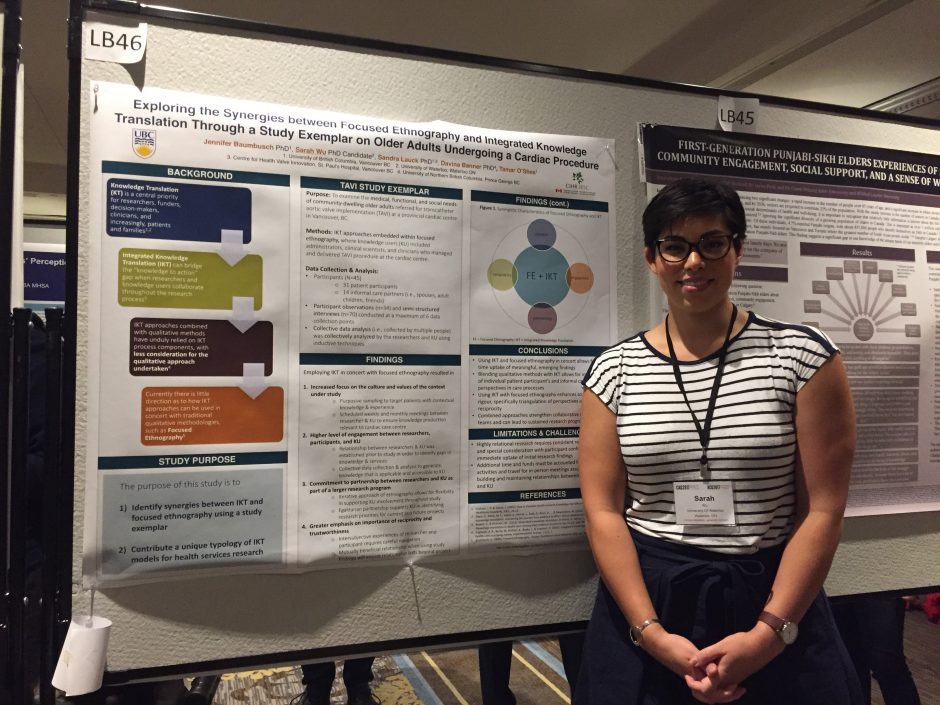
Sarah Wu with Poster
